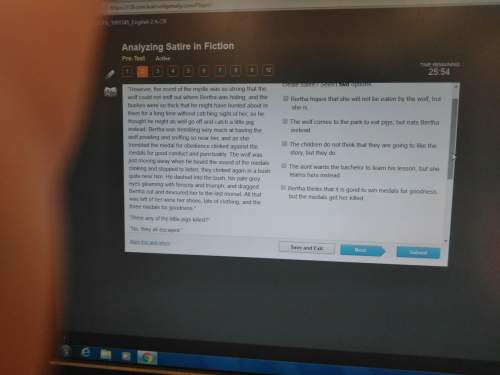From “Mother Tongue”
by Amy Tan
Lately, I’ve been giving more thought to the kind of English...

English, 22.10.2020 23:01, alondra6190
From “Mother Tongue”
by Amy Tan
Lately, I’ve been giving more thought to the kind of English my mother speaks. Like others, I have described it to people as “broken” or “fractured” English. But I wince when I say that. It has always bothered me that I can think of no way to describe it other than “broken,” as if it were damaged and needed to be fixed, as if it lacked a certain wholeness and soundness. I’ve heard other terms used, “limited English,” for example. But they seem just as bad, as if everything is limited, including people’s perceptions of the limited English speaker.
I know this for a fact, because when I was growing up, my mother’s “limited” English limited my perception of her. I was ashamed of her English. I believed that her English reflected the quality of what she had to say. That is, because she expressed them imperfectly her thoughts were imperfect. And I had plenty of empirical evidence to support me: the fact that people in department stores, at banks, and at restaurants did not take her seriously, did not give her good service, pretended not to understand her, or even acted as if they did not hear her.
My mother has long realized the limitations of her English as well. When I was fifteen, she used to have me call people on the phone to pretend I was she. In this guise, I was forced to ask for information or even to complain and yell at people who had been rude to her. One time it was a call to her stockbroker in New York. She had cashed out her small portfolio and it just so happened we were going to go to New York the next week, our very first trip outside California. I had to get on the phone and say in an adolescent voice that was not very convincing, “This is Mrs. Tan.”
And my mother was standing in the back whispering loudly, “Why he don’t send me check, already two weeks late. So mad he lie to me, losing me money.”
And then I said in perfect English, “Yes, I’m getting rather concerned. You had agreed to send the check two weeks ago, but it hasn’t arrived.”
Then she began to talk more loudly. “What he want, I come to New York tell him front of his boss, you cheating me.” And I was trying to calm her down, make her be quiet, while telling the stockbroker, “I can’t tolerate any more excuses. If I don’t receive the check immediately, I am going to have to speak to your manager when I’m in New York next week.” And sure enough, the following week there we were in front of this astonished stockbroker, and I was sitting there red-faced and quiet, and my mother, the real Mrs. Tan, was shouting at his boss in her impeccable broken English.
What is the overall tone?
A.
humble and admiring
B.
cynical and condescending
C.
resentful, yet loving
D.
critical, yet understanding
E.
hopeful and nostalgic

Answers: 3
Other questions on the subject: English

English, 21.06.2019 23:10, maelonramirez
On what evidence did you base your predictions? check the four boxes that apply. there is a rope around his neck. he is in alabama. his hands are tied behind his back. he is standing high above a river. the bridge is for railroads. some crimes are punished by hanging.
Answers: 1

English, 21.06.2019 23:30, paytonpaige22
What does moon shadow think about where the tang people live (text evidence)
Answers: 2

English, 22.06.2019 02:00, DivineMemes420
Matt is writing a literary analysis essay on shakespeare's use of foreshadowing in act 1 scene 1 of richard 3. which lines in this excerpt from that scene can he use as textual evidence in his essay?
Answers: 1
Do you know the correct answer?
Questions in other subjects:


Mathematics, 16.04.2020 16:46




English, 16.04.2020 16:46

Mathematics, 16.04.2020 16:46

Geography, 16.04.2020 16:46








